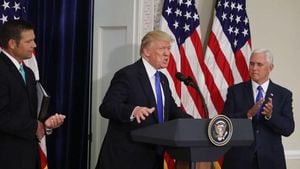Weeks after the recent elections, the Republican Party has emerged victorious, regaining control of both the House of Representatives and the Senate, which they hadn't successfully done for the past four years. This reclamation of power puts the GOP in the driver’s seat as President-elect Donald Trump prepares to take office come January 20, 2025.
Newly reported results confirm the Republican Party will maintain its grip on the House with at least 218 seats, sufficient to securely march forward with their legislative agenda. Speaker of the House Mike Johnson welcomed the news, proclaiming, "It is a beautiful morning in Washington. It is a new day in America. The sun is shining, and that's a reflection about how we all feel. This is a very, very important moment for the country and we do not take it lightly." His comments show an enthusiasm about their plans, which many speculate include significant immigration reform and tax cuts.
With the Senate secured for the Republicans, they will occupy 53 seats out of the 100. Newly elected Senate Majority Leader John Thune replaces Mitch McConnell, who had reigned over the Senate leadership for 18 years. Thune expressed support for President Trump’s agenda and acknowledged the challenges of unifying the party’s diverse factions. He stated, "This Republican team is united behind President Trump's agenda, and our work starts today." While he plans to involve Trump’s input moving forward, Thune also attempted to navigate around Trump’s desire for quick recess appointments for key Cabinet positions, saying, "We must act quickly and decisively to get nominees in place... all options are on the table to make it happen, including recess appointments."
One of Trump's cabinet picks is concerning House Republican Rep. Matt Gaetz, who has made headlines previously for both his contentious political tactics and ethical investigations against him. Trump announced Gaetz’s nomination for Attorney General, which elicited shocked gasps during House Republican meetings. Gaetz, who had recently resigned from Congress, is expected to lead the Justice Department, even as he faced investigations over accusations of sexual misconduct and illicit drug use—breaking headlines just before his nomination.
Republican senators including Susan Collins and Lisa Murkowski voiced strong reservations about Gaetz’s nomination. Collins called for serious introspection on the vetting process for nominees, saying it’s "important for us to answer many questions" during leading confirmation hearings. Still, Gaetz’s allies believe his potential AG role is pivotal as Trump aims to take serious stances on law enforcement, immigration policy, and judicial reforms.
Trump has also stunned many with the nomination of Marco Rubio as Secretary of State, reflecting significant shifts within the party. Rubio’s past criticism of Trump seems to have vanished as he transitions from contender to supporter. He’s viewed as tough on China and Latin American policies, making his nomination part of Trump’s broader international strategy.
Republican leaders expect their control can be used ambitiously, especially when it involves legislative matters like renewing Trump’s tax cuts, slated to expire by the end of 2025, as well as their plans for extensive immigration reforms. Trump’s undeterred stance has always aimed at deporting millions on the very first day of his new term, plans now supported by the Republican majority.
Republicans believe they can leverage their hold on Congress for impactful judicial appointments as well. Current speculation holds some justices may retire under Trump’s presidency, allowing for new conservative nominations to secure their influence on the judicial system for generations to come.
Potential friction may arise as Trump pushes for aggressive global tariffs, favoring protectionist policies, which could lead to some ideological divides within the Republican Party. Nevertheless, there's optimism as the Senate is poised to prioritize confirmations of Trump’s cabinet and judicial nominees starting early next year. The first few months of the new Congress will likely revolve around solidifying this power and enacting long-desired agenda items.
Republicans now find themselves facing the monumental task of unifying and galvanizing their ranks to not only uphold Trump's vision but to bring tangible benefits to American citizens who cast their votes. With the elections concluded, they stand ready to initiate significant changes across the political spectrum—efforts buoyed by recent electoral success. Fears abound about public satisfaction with the upcoming changes, particularly with figures like Gaetz at the forefront, yet the party’s leadership remains steadfast as they launch the next chapter of governance under Republican control.
While all of this runs its course, the American public watches closely, curious to see the immediate and lasting effects these new nominations and policies will spark as the GOP embarks on this newfound control of the government.



